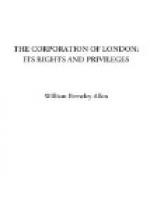on coals and culm imported into London, and also an
additional duty of sixpence per chaldron for fifty
years. By this means the debt of 750,000 pounds
was finally discharged in 1782, but another debt had
been contracted by the Corporation being called upon
to contribute to public improvements beyond the just
limits of their jurisdiction. By the year 1823
no less a sum than 846,300 pounds had been expended
in this manner out of the Orphans’ Fund, and
in the l0th of George IV. a further sum of 1,000,000
pounds was charged upon the fund to defray the expenses
for improving the approaches to London Bridge.
Under William IV., however, the coal duties were fixed
at one shilling per ton in lieu of metage, and an
additional one penny per ton was allowed for the expenses
of the market. This statute extends to a circle
measured by a radius of twenty miles from the General
Post-office, and up to the present time has been productive
of much good to the general interests of the entire
metropolis. A duty upon coals is naturally unpopular,
and it would be difficult to devise one that was otherwise.
It is always easy to raise a popular clamour against
taxes that press upon matters of first necessity,
but in what other way is the public exchequer to be
replenished? It will not suffice to tax objects
of luxury alone, and with regard to the coal duty
it is very improbable that the poor would benefit
in the slightest degree by its repeal. The utmost
reduction in the price of coals that could be expected,
would be a little more than a halfpenny per hundredweight,
and this difference is far more likely to find its
way into the pocket of the vender than into that of
the needy purchaser. There is, moreover, another
trifling consideration to be taken into account before
the abolition of these duties be decided upon.
Relying on the respect usually paid to property in
this country, and confiding in the good faith of the
House of Commons, the Corporation have mortgaged these
duties in order to raise a very large sum of money.
It was not for any purposes of civic ostentation,
or indeed for any purely civic object, that they were
induced to incur this heavy obligation. Cannon
Street, the Model Prison at Holloway, the admirable
improvements and enlargements of the Gaol of Newgate,
attest the disinterested application of the funds
thus obtained. But how is faith to be kept with
their creditors, if their property be snatched from
their hands, and with it all means of making repayment?
If the Legislature deem it just and expedient to deprive
the Corporation of one of their chief sources of revenue,
they are bound to release them from all obligations
incurred through the possession of those sources.
It is not disputed that the Corporation were justified
in raising money upon these securities. If, therefore,
the securities be arbitrarily confiscated by Parliament,
it is to Parliament alone that the holders of those
securities must look for redress. But whence
are funds to be obtained for future improvements?
It would be well if the “faithful Commons”
would take the trouble to find a satisfactory answer
to this obvious inquiry before they finally decide
on ruining the City of London.




